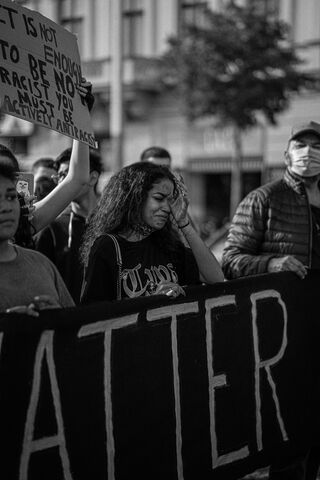Trauma
Why Historical Trauma Is Critical to Understanding Black Mental Health
Historical traumas have lasting consequences for individuals and communities.
Posted October 1, 2020

In a time when the United States is grappling with systematic racism, protests against police brutality and murders of Black people displayed on social media, concerns about the mental health of Black Americans has become a critical issue. In order to better understand the implications of current events, we must also explore the intersections of history and historical trauma and how that may be impacting community responses to current race-based traumatic events.
A historical trauma is an event, or a set of events, that happens to a group of people who share a specific identity and that results in the significant disruption of traditional ways of life, culture and identity. In this case, we are specifically talking about the traumas experienced by Black Americans in the United States. Slavery, the Civil War, Jim Crow, and Segregation are all examples of historical traumas. Each individual event was profoundly traumatic and when you look at these events as a whole, they represent a history of sustained community disturbance and devastation. Black Americans are a resilient people, but these historical traumas have lasting consequences for individuals, families and communities.
Research exploring historical trauma examines how the felt trauma of these events is held internally and passed down to future generations, such that family members who have not directly experienced the trauma are impacted by its effects’ generations later. Studies conducted with the children of Holocaust survivors have led to scientific evidence connecting historical trauma to a change in the human body at the cellular level. This research has suggested that stressful environmental conditions may leave an imprint on the epigenome that is passed down to future generations.
The impact of historical traumas has effects on a person’s brain and body, increasing their vulnerability to anxiety, depression post-traumatic stress disorder (PTSD) and a range of other mental health conditions (Brave Heart et al., 2011). This higher stress vulnerability may also impair a person’s ability to cope effectively with current stressors as they arise, particularly current race-based traumatic situations. This recognition and understanding that the human body holds onto stress reminds us that we cannot ignore the cumulative experiences of historical and current race-based stress and its impact on wellness. In fact, there is a growing body of evidence connecting biological and psychological expressions of historical trauma to the vast array of negative health outcomes experienced by Black Americans today (Duru et al., 2012).
And unfortunately, for Black Americans, historical traumas are not just in the past. They are playing out for us daily, triggering emotional and physiological responses that can be impossible to control and extremely difficult to cope with. In the Black community, individuals not only carry the burden of historical trauma, but must also navigate daily race-based stressors including discrimination, oppression and microaggressions.
It is this cumulative experience of historical trauma and daily race-based stressors that make current events so traumatizing for Black people. When we saw George Floyd killed, we saw our brother, our father, our husband, our son. When we read about what happened to Breonna Taylor, we were reading about our sister, our mother, our wife, our daughter. These events are not experienced in isolation. Rather they become part of the cumulative experience of our historical trauma. As such, we are triggered emotionally every time we see it, talk about it, hear about it. This affects all of us in ways we may not even realize.
If you are having a hard time coping with the current events in the world, as a licensed mental health provider I want to provide a few strategies that might help you or someone else:
- If you are NOT OK, know that it is OK to not be OK. Create safe spaces with others you trust so you can openly discuss the pain you are experiencing. You are not alone.
- Identify positive coping strategies that have worked for you in the past and utilize them. These may be different for all of us but think about what works for you. Perhaps it is meditation, journaling, reflective writing, dancing, song, prayer, or running.
- Schedule time for your self-coping. We all lead busy lives, and many of us create time to help others yet don’t find time to help ourselves. It is important to schedule self-care into your calendar. We sometimes must remind ourselves that we cannot be present for others until we show up for ourselves.
- Take a break from the news and social media. Spend some time focusing on how you can make a difference in your community.
- Do something! Use your skills, expertise, and unique perspective to do something to make a difference. The platform is open, it is what we do now that will make a difference. Each of us has to figure out what our respective powers are and bring them to bear in this critical time. For those of you who are educators, educate! For those of you who are activists, take to the streets, protest, and use your voice to represent others who can’t. For those of you with expertise in finance, create programs targeted at Black youth to help them learn how to save money, invest and create opportunities to build wealth in our community. For those of you who are politically savvy, support people to go out and vote. Identify politicians in your area who you can get behind and help elect them to office locally and nationally. If none exist, then maybe that person can and should be you. For those of you who are artists, let your protest speak through your art and engage the youth so they can learn to do the same. If you are a health professional, find a way to get help to your community. For White allies, being non-racist isn’t enough. We need anti-racist voices and statements coming from non-Blacks. Use what you know to teach others.
- And lastly, if you are experiencing an amount of stress and emotion that you feel has impacted your ability to be effective at work, school or in relationships, don’t be ashamed to seek professional help. You don’t have to muddle through life dealing with these debilitating symptoms. Professional mental health counseling is effective and can help you deal with the impact of historical and current race-based trauma.
While exploring our past helps us to understand how historical traumas may impact current race-based trauma experiences, it also provides opportunities to reflect on our successes, to remember critical movements in history and the key leaders who have pushed this country forward. While we still have a long way to go, it is important to remember just how far our country has come. This gives me hope for our own future and that of future generations.
References
Brave Heart, M. Y. H., Chase, J., Elkins, J., & Altschul, D. B. (2011). Historical trauma among indigenous peoples of the Americas: Concepts, research, and clinical considerations. Journal of psychoactive drugs, 43(4), 282-290.
Duru, O. K., Harawa, N. T., Kermah, D., & Norris, K. C. (2012). Allostatic load burden and racial disparities in mortality. Journal of the National Medical Association, 104(1-2), 89-95.


